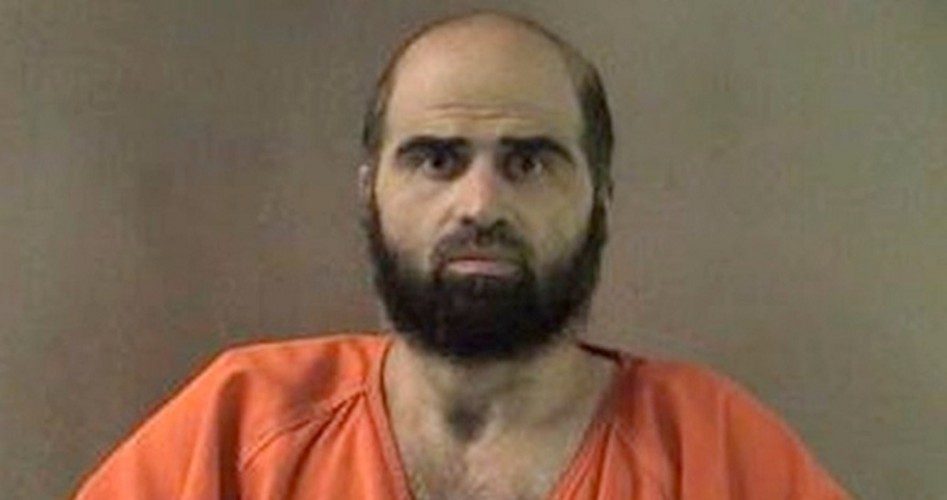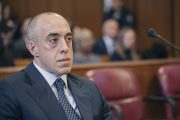
On Monday the U.S. Court of Appeals for the Armed Forces issued an order indefinitely postponing the court martial of Nidal Hasan, the Army major charged with the Ft. Hood shootings.
In its order, the court offered very little explanation for its decision other than to say that the proceedings were to be continued “pending further review of the court.”
Following last week’s decision by the U.S. Army Court of Criminal Appeals (a lower appeals court) that the government could forcibly shave off Hasan’s beard, the defense lawyers announced they would be filing an appeal.
The saga of the beard has worked the effect of delaying the trial on the merits of the serious charges pending against the former psychiatrist.
On December 2009, Army prosecutors charged Hasan with 32 counts of attempted murder in connection with the victims wounded in his armed rampage at Ft. Hood, Texas, on November 5, 2009.
Among those injured by Hasan were the two civilian police officers who eventually fired on Hasan and brought him down, ending the massacre. These lesser charges are in addition to the 13 counts of murder with which the former army psychiatrist and alleged jihadist was charged.
On the day of the shooting spree, Hasan reportedly entered the center for soldiers awaiting deployment to Afghanistan and Iraq, brandished two pistols, and climbed on a table and opened fire. Then, targeting first those in uniform, Hasan shouted “Allahu Akbar!” — Arabic for “God is Great.”
Federal investigators claim that Hasan’s “militancy” was influenced by the late American-born Muslim cleric Anwar al-Awlaki. President Obama placed Awlaki on his infamous (and illegal) kill list and on September 30, 2011, while Awlaki was eating breakfast in Yemen, two unmanned Predator drones fired two Hellfire missiles, killing him.
If convicted, the Uniform Code of Military Justice (UCMJ) provides for a death sentence in Hasan’s case.
During his imprisonment, Hasan — a Muslim — has grown a beard. While Army regulations prohibit the growing of beards (except in the case of medical necessity), Hasan argues that growing a beard is a requirement of his faith.
Beyond the seemingly less significant controversy surrounding Hasan’s beard, there is the request by the families of the victims of the attack that Hasan’s rampage be considered an act of terror.
As reported in the Washington Times, 160 victims of the shooting petitioned Secretary of Defense Leon Panetta to reclassify the attack “terrorism” rather than “workplace violence.”
The Pentagon announced last Friday that it would not change the designation of the crime.
In the Washington Times article, a spokesman for Panetta “cited concern that having the government weigh in could bias the case against” Hasan.
The statement e-mailed to the Washington Times by Defense Department spokesman George Little explained the thinking behind his boss’s decision:
The Department of Defense is committed to the integrity of the ongoing court martial proceedings of Major Nadal Hassan [sic] and for that reason will not further characterize, at this time, the incident that occurred at Fort Hood on November 5, 2009. Major Hassan has been charged with 13 counts of premeditated murder, and 32 counts of attempted murder. As with all pending UCMJ matters, the accused is innocent until proven guilty.
Another possible motivation for Panetta’s refusal to grant the families’ request is the protection of the reputation of his own boss — President Barack Obama.
President Obama regularly proclaims his administration’s success in protecting the United States from a terrorist attack. Were Hasan’s crimes to be reclassified as a terrorist attack, the president would be made a liar. While that’s never a good tack for cabinet members to take, it’s especially unwise just days before an election.
Other observers have noticed this predicament. As the Washington Times article reports:
Jeffrey F. Addicott, the director for Center for Terrorism Law at St. Mary’s University School of Law in San Antonio, accused the Pentagon of “playing word games” just days before Monday night’s final debate between President Obama and Republican rival Mitt Romney in which foreign policy was the main focus.
Acknowledging Maj. Hasan’s alleged shooting spree as a major terrorism attack on the homeland “destroys the administration’s narrative that al Qaeda is winding down” and there is a diminishing threat of a terrorist attack occurring on U.S. soil, Mr. Addicott said.
Regardless of the government’s preference for one word over another, there is an undeniable terror angle to the Hasan story.
In the days following the horrific hail of gunfire at Ft. Hood, investigations began searching for possible motives that could compel Major Hasan to fire on and mortally wound his fellow servicemen.
Hasan, a psychiatrist educated at Virginia Tech University and the Uniformed Services University of the Health Sciences, was born in Virginia to immigrant parents from the West Bank. As a Muslim, Hasan’s piety and devotion to radical Islam had increased, as evidenced by his own rantings, conversations, and e-mails with Anwar al-Awlaki, a Yemeni-based American-born Muslim who was placed by President Obama on a kill list and subsequently assassinated by a U.S. drone in October 2011.
Despite being an American army officer sworn to be true to the Constitution of the United States, remarkably, Hasan listed his nationality as “Palestinian” on forms requesting his nationality.
Apart from his devotion to the precepts preached by Awlaki, there were other signs that Hasan had adopted a dangerous attitude toward his Army, his country, and the war on terror into which he might soon be called as a combatant. He is suspected of having written various posts in online forums comparing the selfless acts of soldiers who jump on grenades to save the lives of comrades to those of suicide bombers. He allegedly told a co-worker at Fort Hood that he hoped that someday soon his fellow Muslims would unite and rise up against American “aggressors.”
A Muslim soldier also stationed at Fort Hood and acquainted with Hasan told reporters that Hasan railed against the war on terror, calling it a war against Islam that was financed by Jews. Multiple sources have indicated that Hasan did not try to keep these opinions to himself. In fact, he was reprimanded for having preached his doctrines to patients under his care at both Walter Reed Medical Center and Fort Hood.
Other examples of Hasan’s behavior while employed at Walter Reed unequivocally foreshadowed a violent and treasonous streak. Co-workers and supervisors who worked with Hasan at Walter Reed have told several news agencies that beginning in the spring of 2008 during Hasan’s training there, a “series of meetings” were convened to discuss “serious concerns” about Major Hasan’s disturbing topics of conversations held with colleagues and patients, bizarre statements made to supervisors, and how such behavior was affecting his work. Unnamed officers present at the meetings claim that based on evidence presented at these meetings, there was reasonable suspicion that if Hasan were deployed to Iraq or Afghanistan he might betray his country and offer aid and intelligence to the enemy, to the point of killing fellow servicemen as a Muslim sergeant had in 2003.
Despite regarding Major Hasan as a potential traitor to his country and one with perceived capacity for killing countrymen in the name of his religion, commanders at Walter Reed chose not to dismiss Hasan from the program because of how “cumbersome and lengthy” such a process is. Also, because Hasan is a Muslim and the terrorists with whom the United States is at war are Muslim, directors of the program were concerned that any disciplinary action could be interpreted as discriminatory and motivated by religious intolerance and profiling.
Further evidence of the Army’s possible negligence in failing to take appropriate action against Hasan is found in the record of his time studying at an army hospital. While completing his residency at Walter Reed Army Medical Center, Major Nidal Hasan told an audience of fellow physicians that the Army should excuse Muslim soldiers from serving in combat zones where they would be fighting others of their faith. If Muslims in the U.S. Armed Forces were not thus afforded conscientious objector status, then there could be “adverse effects,” Hasan warned.
Then, in the summer of 2007, Hasan and his fellow residents were assigned by their superiors at Walter Reed to prepare a presentation on any topic of medical relevance. They were then to present their work to a group of senior psychiatrists as part of their final student evaluation.
As Major Hasan stepped to the podium and began his address to the 30 or so medical professionals in attendance, instead of confining himself to the assigned topic, for over an hour he showed 50 slides and lectured on suicide bombers, general principles of Islam, and the potential harm that the Army could expect from Muslim soldiers torn by conflicting loyalties to God and country. “It’s getting harder and harder for Muslims in the service to morally justify being in a military that seems constantly engaged against fellow Muslims,” Hasan told the undoubtedly perplexed crowd.
Eerily, Hasan’s presentation, which he entitled “The Koranic World View as It Relates to Muslims in the U.S. Military,” ended with a final slide that read: “We love death more then [sic] you love life!”
For its part, the Army claims that it never received any intelligence reports from the government agents monitoring Hasan’s electronic correspondence that would have justified official reprimand or discipline.
In spite of their claim of ignorance, the record of Hasan’s questionable behavior is clear and the Army cannot claim that it was unaware of Hasan’s unsatisfactory performance while at Walter Reed and the potentially harrowing content of his presentation and conversations while employed there.
The delay ordered by the military appeals court on Monday will likely guarantee that Hasan’s trial will begin after the third anniversary of the horrific acts of violence of which he is accused.
Photo of Major Nidal Hasan: AP Images


